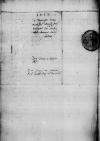Multo iam tempore exacto, litteris nullis tuis refectae, dubia spe rerum nostrarum distrahimur nec scimus, quid interea fecerit S(trenui)tas or S(inceri)tas⌈S(trenui)tasS(trenui)tas or S(inceri)tas⌉
Tua, id autem eandem ignorare nolumus, quod dominus Hernando de Alarcón (*1466 – †1540), famous Spanish general, participant in war of Granada and Italian Wars, trusted advisor of Emperor Charles V of Habsburg; after the battle of Pavia (1525) Francis I King of France was committed to his custody; after the Sack of Rome (1527) he also guarded the captive Pope Clement VII; viceroy of Calabria, marquis de Valera and castellan of Castelnuovo in Naples (LARRAÑAGA, p. 412)⌊AlarconeHernando de Alarcón (*1466 – †1540), famous Spanish general, participant in war of Granada and Italian Wars, trusted advisor of Emperor Charles V of Habsburg; after the battle of Pavia (1525) Francis I King of France was committed to his custody; after the Sack of Rome (1527) he also guarded the captive Pope Clement VII; viceroy of Calabria, marquis de Valera and castellan of Castelnuovo in Naples (LARRAÑAGA, p. 412)⌋, castellanus Barensis nec substitutus written over ...⌈... illegible⌈...... illegible⌉nec substitutusnec substitutus written over ...⌉, secundum commissionem et mandatum sacrae Charles V of Habsburg (*1500 – †1558), ruler of the Burgundian territories (1506-1555), King of Spain as Charles I (1516-1556), King of Naples and Sicily, King of the Romans (1519-1530), Holy Roman Emperor of the German Nation (elected 1519, crowned 1530, abdicated 1556); son of Philip I the Handsome and Joanna the Mad of Castile⌊caesareae maiestatisCharles V of Habsburg (*1500 – †1558), ruler of the Burgundian territories (1506-1555), King of Spain as Charles I (1516-1556), King of Naples and Sicily, King of the Romans (1519-1530), Holy Roman Emperor of the German Nation (elected 1519, crowned 1530, abdicated 1556); son of Philip I the Handsome and Joanna the Mad of Castile⌋ nullam hactenus nobis fecit fidelitatis suae iuratoriam professionem et oboedientiam, et cum suus substitutus cum litteris caesaree maiestatis nostro nomine desuper requisitus fuerat, respondit se id a suo castellano non habere in commissis nec id facere debere vel posse sine sua scientia et voluntate.
Itaque agat S(trenui)tas or S(inceri)tas⌈S(trenui)tasS(trenui)tas or S(inceri)tas⌉
Tua, si nondum nos voto nostro potimur, ut saltem interea ille castellanus, quem ibi esse praesentem audimus, in manibus S(trenuita)tis or S(incerita)tis⌈S(trenuita)tisS(trenuita)tis or S(incerita)tis⌉
Tuae hoc ipsum praestaret iuramentum et mandatis ac commissis sacrae caesareae maiestatis satisfaceret, vel prout commodius noverit S(trenui)tas or S(inceri)tas⌈S(trenui)tasS(trenui)tas or S(inceri)tas⌉
Tua, sic hoccine negotium, ita ut opus sit, perficiat, quodque Hernando de Alarcón (*1466 – †1540), famous Spanish general, participant in war of Granada and Italian Wars, trusted advisor of Emperor Charles V of Habsburg; after the battle of Pavia (1525) Francis I King of France was committed to his custody; after the Sack of Rome (1527) he also guarded the captive Pope Clement VII; viceroy of Calabria, marquis de Valera and castellan of Castelnuovo in Naples (LARRAÑAGA, p. 412)⌊AlarconeHernando de Alarcón (*1466 – †1540), famous Spanish general, participant in war of Granada and Italian Wars, trusted advisor of Emperor Charles V of Habsburg; after the battle of Pavia (1525) Francis I King of France was committed to his custody; after the Sack of Rome (1527) he also guarded the captive Pope Clement VII; viceroy of Calabria, marquis de Valera and castellan of Castelnuovo in Naples (LARRAÑAGA, p. 412)⌋, si ibidem iuramentum praestare noluerit, committeret hoc et mandaret suo substituto litteris suis, quas vel illi mittatis.
Non dubitamus iam vos ibi intellexisse de casu infortunatissimo serenissimi domini Louis II Jagiellon (*1506 – †1526), 1516-1526 King of Bohemia and Hungary; son of Ladislaus II Jagiellon King of Bohemia and Hungary, killed in the battle of Mohács, and his third wife, Anne de Foix⌊regis Hungariae et BohemiaeLouis II Jagiellon (*1506 – †1526), 1516-1526 King of Bohemia and Hungary; son of Ladislaus II Jagiellon King of Bohemia and Hungary, killed in the battle of Mohács, and his third wife, Anne de Foix⌋, et quid ei acciderit in proelio cum Suleiman the Magnificent (*1494 – †1566), 1520-1566 Sultan of the Ottoman Empire⌊Thurcarum imperatoreSuleiman the Magnificent (*1494 – †1566), 1520-1566 Sultan of the Ottoman Empire⌋ habito, iamque haec Hungary (Kingdom of Hungary)
Bohemia (Čechy, Kingdom of Bohemia), country in central Europe⌊regnaHungary (Kingdom of Hungary)
Bohemia (Čechy, Kingdom of Bohemia), country in central Europe⌋ fore in maximo periculo, ni sacra Charles V of Habsburg (*1500 – †1558), ruler of the Burgundian territories (1506-1555), King of Spain as Charles I (1516-1556), King of Naples and Sicily, King of the Romans (1519-1530), Holy Roman Emperor of the German Nation (elected 1519, crowned 1530, abdicated 1556); son of Philip I the Handsome and Joanna the Mad of Castile⌊caesarea maiestasCharles V of Habsburg (*1500 – †1558), ruler of the Burgundian territories (1506-1555), King of Spain as Charles I (1516-1556), King of Naples and Sicily, King of the Romans (1519-1530), Holy Roman Emperor of the German Nation (elected 1519, crowned 1530, abdicated 1556); son of Philip I the Handsome and Joanna the Mad of Castile⌋ provideret. Et quid tandem Charles V of Habsburg (*1500 – †1558), ruler of the Burgundian territories (1506-1555), King of Spain as Charles I (1516-1556), King of Naples and Sicily, King of the Romans (1519-1530), Holy Roman Emperor of the German Nation (elected 1519, crowned 1530, abdicated 1556); son of Philip I the Handsome and Joanna the Mad of Castile⌊illa maiestasCharles V of Habsburg (*1500 – †1558), ruler of the Burgundian territories (1506-1555), King of Spain as Charles I (1516-1556), King of Naples and Sicily, King of the Romans (1519-1530), Holy Roman Emperor of the German Nation (elected 1519, crowned 1530, abdicated 1556); son of Philip I the Handsome and Joanna the Mad of Castile⌋ facere deliberat, maturius est consulendum. Quae omnia nobis perscribat S(trenui)tas or S(inceri)tas⌈S(trenui)tasS(trenui)tas or S(inceri)tas⌉ Tua.
Et bene valeat S(trenui)tas or S(inceri)tas⌈S(trenui)tasS(trenui)tas or S(inceri)tas⌉
Tua.


 BCK, 3465, p. 148
BCK, 3465, p. 148